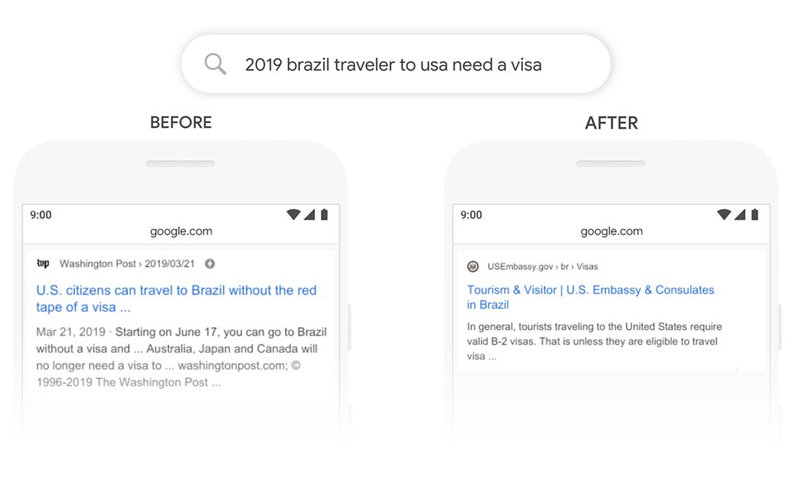On 25th October, Google released what it calls the most important update to its search algorithm in years — BERT. Naturally, everyone from business owners to digital marketers has been in a tizzy since then. While some people saw a dramatic fluctuation in their rankings, others saw barely any change and started questioning whether BERT really is an issue in the first place. So, to manage some of the hysteria currently surrounding this update, we decided to break down BERT for you. We’ll talk about what this update is all about, how it’s going to affect search engine rankings, and how you can respond to it in the best possible way.
What is BERT really about?

BERT is short for Bidirectional Encoder Representations from Transformers. While this may sound intimidating, its implications are actually fairly straightforward. It simply means that the Google search algorithm can now understand the context of words in a search string. Does that sound a bit confusing?
Let’s break it down even further. With the BERT update, Google now uses NLP (Natural Language Processing) to understand the importance of transformer words (like “to” and “for”) within the search term that a user inputs. Previously, the search engine would focus only on the keywords, without giving much thought to these transformer words and how they actually affect the meaning of the search query.
We can take a look at one of Google’s own “before and after” examples to see how BERT really works. Let’s take a search for “2019 brazil traveller to USA need a visa.” If the importance of the word “to” in this search is not understood, then Google wouldn’t have been able to figure out whether the query is about a Brazilian travelling to the USA or vice-versa. Before BERT, this search term therefore also returned results about US citizens travelling to Brazil. Now, with BERT, the search engine is able to understand that the word “to” is actually very important in this context and changes the meaning of the search query completely. Here’s what the before and after search results look like:

Why BERT could have affected your rankings adversely

If you’re one of those people who saw a dramatic fall in their rankings right after BERT was released, here are some possible reasons. They may not all apply to you, but one or more definitely will.
Your ‘informational search’ game isn’t strong
Informational searches are those types of searches where users are seeking specific information about something. A Penn State research study shows that 80% of Google searches are currently informational searches. These searches are the most likely to be affected by BERT because they usually use more transformer words. If you don’t have the kind of content that would rank high for an informational search, you may have lost out on your rankings in a big way.
You were ranking high for irrelevant searches
Let’s take the example above. Say your website provides information for US citizens travelling to Brazil. Earlier, a query like “2019 brazil traveler to USA need a visa” might have shown your result page in the rankings, but not anymore. This is probably not such a bad thing as you don’t need to rank higher for search queries that aren’t relevant to your content.
Local SEO is winning now
Local SEO tends to rely very heavily on transformer words like “for”, “at”, and “in” so there’s a chance that these searches are now throwing up more local results, pushing your website down.
Keyword stuffing has become even more obsolete
For years, SEO experts have been saying that Google is looking more at quality content, than mere stuffing of keywords. This particular update is another step in the same direction. So if you still have content that’s designed more for search engines rather than for end-users, it’s probably time to rethink your strategy.
What you can do about BERT today

If you have been affected by BERT in a big way, try some of these tips to get back into the game. Even if your rankings haven’t been affected in particular, it might still be a good idea to implement these suggestions anyway because things will keep shifting in the next few months as websites keep evolving to adapt to BERT.
Stop pretending it’s 2009 and get rid of keyword stuffing
This is probably the most important advice to keep in mind. In the late 2000s and early 2010s, many businesses started churning out poor quality articles that made little sense for readers but were stuffed with keywords and designed to satisfy the search engine algorithm only. In the last few years, most of the Google search engine updates have focused on preventing this from happening, and BERT is no exception. Since BERT uses NLP, it emphasizes more on natural-sounding content that is valuable to end-users, rather than content that is stuffed with keywords in an unnatural, inorganic way. So in case you haven’t done this already, it’s high time you revamp your content in a way that makes it more amenable to readers vis-a-vis search engines.
Take another look at how you’re capturing informational searches
If your rankings have gone down dramatically after BERT, start by examining which keywords and search terms are no longer performing as well. Search for those keywords and look at the kind of content that is now making it to those high ranks. Find ways to incorporate what’s working for this content into your existing content or create new content which is more geared towards informational search.
At the end of the day, BERT is not some crazy, out-there update. It simply builds on Google’s underlying goal — which is to make Search more useful and relevant for users. If you’ve already been building content geared towards end-users, chances are BERT won’t affect you in a big way in the long run. If you’re still in the “create content for search engines” zone, this is probably the push you need to make a drastic change in your content strategy.




